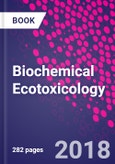Biochemical Ecotoxicology: Principles and Methods presents practical approaches to biochemical ecotoxicology experiments for environmental protection and conservation.
With its methodical, stepped approach this essential reference introduces readers to current techniques for toxicity endpoint testing, suitable for laboratories of any size and budget. Each chapter presents a state-of-the-art principle, a quick and inexpensive procedure (including appropriate reagents), case studies, and demonstrations on how to analyze your results.
Generic techniques are covered, suitable for a variety of organisms, as well as high-throughput techniques like quantitative polymerase chain reactions and enzyme-linked immunoassays. Cutting-edge approaches, including gPCR arrays and lipidomic techniques, are also included, making this is an essential reference for anyone who needs to assess environmental toxicity.
- Practical, cost-effective approaches to assess environmental toxicity endpoints for all types of organism
- Presents theory, methods, case studies and information on how to analyze results
- State-of-the-art techniques, such as 'omics' approaches to toxicology
Table of Contents
1. Quantitative Assessments of Biochemical Assesments 2. Tissue Preparation and Subcellular Fractionation Techniques 3. Preparation and Maintenance of Live Tissues and Primary Cultures for Toxicity Studies 4. Measuring Effects at the Gene Expression Level 5. Metal Metabolism and Detoxication 6. Oxidative Stress 7. Xeno Biotransformation 8. Cellular Energy Allocation 9. Neuroendocrine Disruption 10. Genotoxicity 11. Biomarkers of Infection and Diseases 12. Descriptive and Analytical Statistics in Biochemical Ecotoxicology 13. Integration of Biomarkers into Indices








